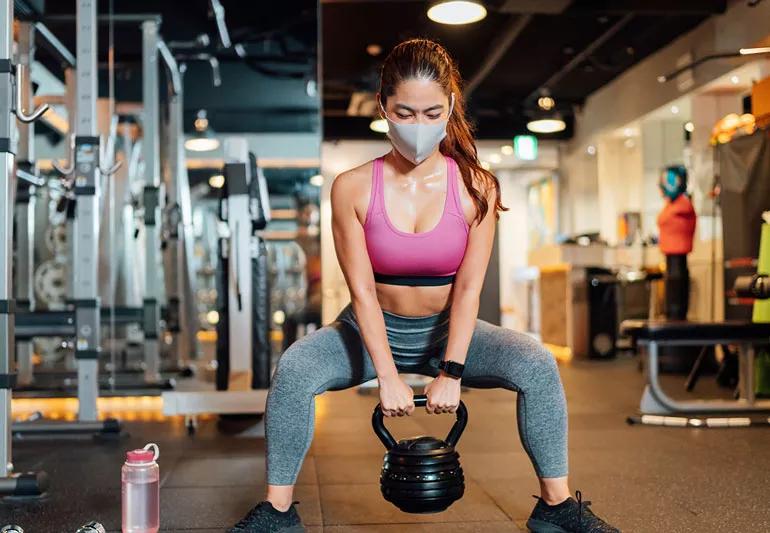The short answer from an infectious disease specialist

Image content: This image is available to view online.
View image online (https://assets.clevelandclinic.org/transform/e7163c53-8bdb-49cf-92c1-c690d189cb47/exerciseFacemask-1254069551-770x553-1_jpg)
woman exercising while wearing a face mask
A: Look for a face mask that sits higher up off your mouth and nose so that you’re not sucking your mask back in when you breathe. You’ll want your mask to fit properly and be comfortable and breathable, but you also want a seal around the nose and mouth. So look for a mask that fits tightly, but allows for comfortable breathing.
Advertisement
Cleveland Clinic is a non-profit academic medical center. Advertising on our site helps support our mission. We do not endorse non-Cleveland Clinic products or services. Policy
Several fitness brands have released face masks specifically for exercising that use moisture wicking fabric or a blend of spandex. These types of fabric can feel lighter and easier to breathe in. Be sure to wash your face mask or use a new one after every workout.
I don’t recommend exercising in vented face masks because those don’t offer protection to anyone. Vented masks are meant for keeping out dust particles when you breathe in, but when you breathe out respiratory and mucus particles can come out as well.
Wearing a face mask is going to make exercise a little more difficult, but it can be done safely. If you exercise with a face mask on, be sure to monitor how you’re feeling and watch for signs of lightheadedness, dizziness and shortness of breath. You might need to modify your workout depending on how adjusted you are to exercising with a face mask on. Someone who has a high level of fitness might not feel the effects of a face mask as much as someone who just started to exercise.
If you have an underlying medical condition, talk to your doctor before opting to wear a face mask while exercising.
– Infectious disease specialist Kristin Englund, MD.
Advertisement

Sign up for our Health Essentials emails for expert guidance on nutrition, fitness, sleep, skin care and more.
Learn more about our editorial process.
Advertisement
A pediatric psychologist weighs in on continued masking for kids
The short answer from an infectious disease specialist
What to know about running in a face mask during the coronavirus pandemic
Proper etiquette for asking others to comply with mask rules
Learn how one simple action can help keep the whole family safe
Talking points from a healthcare provider
Make it easier to hear and be heard
The short answer from an infectious disease specialist
Type 2 diabetes isn’t inevitable with these dietary changes
Applying a hot or cold compress can help with pain
Pump up your iron intake with foods like tuna, tofu and turkey